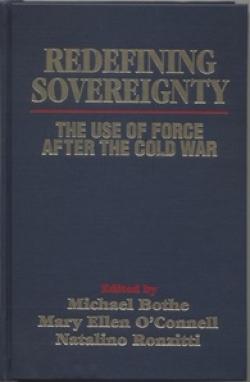Redefining Sovereignty. The Use of Force After the End of the Cold War

With considerable insight and analysis, the editors and contributors to the book—the world’s leading ethicists, political scientists and international lawyers—investigate the use of force since the end of the Cold War and, simultaneously, what changes have or should occur with respect to sovereignty and the law in the 21st century. Redefining Sovereignty has resulted from three groundbreaking workshops on international law and the use of force: the first was held in Rome soon after NATO’s 1999 intervention in Kosovo; the second took place in Frankfurt after the U.S.-led invasion of Afghanistan; and the third occurred in Columbus, Ohio after the U.S.-led invasion of Iraq. Together, these and other uses of armed force since the end of the Cold War have raised new and challenging questions for the international law and policy on the regulation of armed conflict. These questions are explored in the thoughtful text, including: With the end of superpower rivalry have these uses of force had a particular impact on the state system? Have they, for example, affected the concept of state sovereignty? Have they affected the legal regime on the use of force? By the time of the Iraq invasion in March 2003, had some uses of force long-considered prohibited by the principle of non-intervention become lawful? Did the use of force to protect human rights, to respond to terrorism, for arms control or to preempt future threats become lawful or if not lawful, somehow otherwise legitimate?
Volume produced in the framework of the project "Redefining Sovereignty: The Use of Force After the End of the Cold War: New Options Lawful and Legitimate?" conducted by the Istituto Affari Internazionali (IAI) in collaboration with the Johann Wolfgang Goethe University of Frankfurt and the Ohio State University College of Law in Columbus.
Preface
Contributors
Part I. After Kosovo
1. Report from Rome on Redefining Sovereignty: The Use of Force After the End of the Cold War: New Options Lawful and Legitimate?, Michael Bothe, Marina Mancini and Natalino Ronzitti
2. Report from Frankfurt on Redefining Sovereigny: The Use of Force in the Post-Cold War: New Options, Lawful and Legitimate?, Michael Bothe and Andreas Fischer-Lescano
Part II. Ethical and Policy Considerations in Regulating Force
3. The Use of Force in the Post-Cold War Era: From Collective Action Back to Pre-Charter Self Defense?, Lothar Brock
4. National Sovereignty and International Responsibility: Legal and Policy Aspects, Dieter Fleck
5. Ordering the New World, John Mueller
Part III. Legal Concepts and Core Institutions in Regulating Force
6. The Current Status of Legal Principles Prohibiting the Use of Force and Legal Justifications of the Use of Force, Natalino Ronzitti
7. Sovereignty, the Security Council and the Use of Force, Yoram Dinstein
8. American Hyper-Sovereignty from Kosovo to the “Global War on Terror”, Mary Ellen O’Connell
9. The Role of Regional Organizations in Maintaining Peace and Security, Jost Delbrück
10. The End of the Conflict and Post-Conflict Peace-Building, Andrea Gioia
11. The Dimensions of Domestic Constitutional and Statutory Limits on the Use of Military Force, Michael Bothe and Andreas Fischer-Lescano
Part IV. Case Studies
12. ECOWAS Operations in Liberia and Sierra Leone: Amnesty for Past Unlawful Acts or Progress Towards Future Rules?, Marco Gestri
13. Might for Rights: The French Intervention in Rwanda 1994, Andreas Hasenclever
14. Forcible Humanitarian Action: The Case of Kosovo, Marc Weller
15. Redefining Sovereignty via International Constitutional Moments? The Case of Afganistan, Andreas Fischer-Lescano
16. Legality of Maritime Interception Operations within the Framework of Operation Enduring Freedom, Wolff Heintschel v. Heinegg
17. The Legality of the Use of Force: Iraq in 2003, Christopher Greenwood
18. Has Article 2(4) Survived the Iraq War?, Michael Bothe
Part V. After Iraq
19. Report from Columbus: Discussions on the Future of Law and Institutions on the Use of Force in a One Superpower World, edited by Mary Ellen O’Connell and B. Welling Hall
Index


